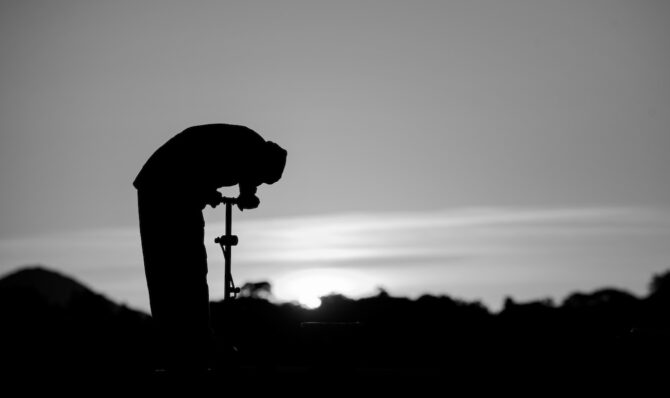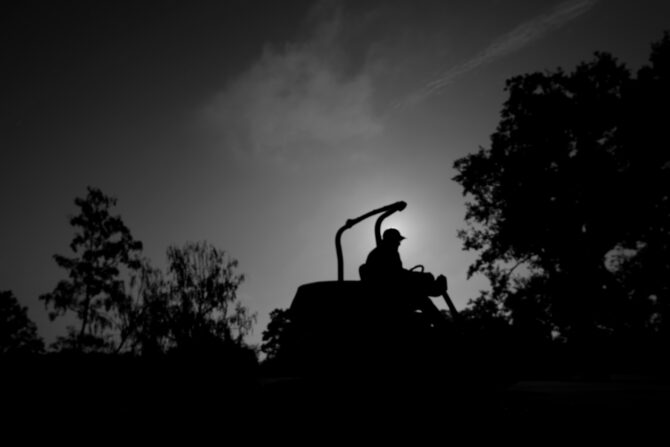Sign up for our daily newsletter
Latest news, reviews, analysis and opinion, plus unmissable deals for bunkered subscriptions, events, and our commercial partners.
Early one morning, in October 2021, the body of Dave Everett was found by walkers in woods near Staple Hill car park in Taunton.
The 61-year-old had hanged himself, leaving behind a distraught family. A subsequent inquest into his death heard how losing his job as a greenkeeper at Lyme Regis Golf Club during the Covid-19 pandemic had devastated a “family man who was loved by everybody”.
Everett had been a part of the team at the Dorset club for 33 years but was let go as bosses wrestled with financial difficulties exacerbated by lockdown.
“He didn’t want to leave the place he loved,” his widow Julie revealed. “He had worked most of his life at the golf club and it had destroyed him.”
His son Scott added: “That job was everything to him. He put his heart and soul into Lyme Regis Golf Club and was completely broken when he was made redundant.”
The final straw, said his family, came when he returned to the club not long after he was let go and found that it had employed a new member of the greenkeeping team.
Unable to cope, Everett walked into the woods and took his own life.
His death came less than five years after another greenkeeper, John Byrne, also committed suicide. The 39-year-old was a father of one and his wife, Cheryl, was heavily pregnant with twins when he drove his van into the River Thames and drowned in December 2016.
His circumstances were different to Everett’s. Byrne, who worked at Wentworth Golf Club, had been diagnosed with severe depression with anxiety two years before his death, issues amplified by gambling and harmful alcohol use.
An inquest heard he was £5,000 in debt and drinking between four and six pints every Friday, Saturday and Sunday. He had also received care from mental health services – most notably the Surrey and Borders Partnership NHS Foundation Trust – and been discharged after a period of hospitalisation on December 6. He killed himself two days later.
Whilst mercifully rare, these tragedies have shone a light on the very specific mental health difficulties that those who work in greenkeeping are vulnerable to. It’s time to address those difficulties. It’s time to talk.
* * *

MANY OF THE THINGS THAT MAKE A JOB in greenkeeping so appealing are, quite often, the same things that make it a challenge for those who suffer from poor mental health: the open air, the small team environment, a working day that finishes at lunchtime, the opportunity to prepare and present a product for a discerning customer base – when things are good, they’re great.
But there’s a flip-side. The sun doesn’t always shine. Not every workforce has a supportive, healthy dynamic. The anti-social hours demand sacrifices and can make for long, lonely afternoons. And the criticism from people who think they know better? That can be vicious, regular and tough to take.
Nobody understands these issues better than the British and International Golf Greenkeepers’ Association (BIGGA). In 2021, with the UK still mired in lockdown and uncertainty – and courses opening and closing, opening and closing – BIGGA decided to take the temperature of the turf-care professionals it represents with a survey. The findings were alarming.
Of the more than 200 members it canvassed, 7% revealed that they constantly worry about their own mental health, while another 20% frequently worry and 41% sometimes worry about their mental state.
A disconcerting 80%, meanwhile, said they had worried about the mental health of someone they work with, 8% of whom revealed that those worries were constant.
• gWest: The great enigma of Scottish golf
• The best Scottish course you’ve never played
Let’s put some context around those figures. In 2019, the average 18-hole golf course had five-and-a-half full-time and one seasonal greenkeeper taking care of it. For the sake of argument, let’s call that six greenkeepers per 18-hole course and three per nine-holer. According to recent R&A data, there are over 3,000 golf courses in the UK. That amounts to approximately 18,000 greenkeepers employed to maintain courses in the United Kingdom alone. This means that there are currently around 12,000 greenkeepers in the UK who have concerns over their mental well-being, of whom over one thousand worry about it constantly.
Nicholas Thorley can relate to them. Now 43, Nicholas has worked in the industry since he stumbled into it as a teenager.
“I left school at 16 and was given an ultimatum by my dad: either get a job or move out,” he told bunkered.
“I had done some work experience as a greenkeeper and had enjoyed it, so I decided that was the life for me.”
It’s a decision that has taken him to the USA and New Zealand and, finally, back home to England. “For me, it’s a hobby as much as a job,” he added. “I love everything about it. I love being outside in nature, being my own boss, starting early and finishing early. I couldn’t be in an office, put it that way.”
Having settled in Birmingham, he moved shortly before the pandemic hit after accepting the head greenkeeper position at a club in Devon. “I worked so hard to try from the outset to try and put my mark on the course,” he revealed. “At one point, I was working 80 to 90 hours a week. I felt like I had to prove my worth. Then lockdown hit and I was furloughed on the spot.”
To make ends meet and keep his mind active, Nicholas took a part-time job as a delivery driver for Tesco. He figured it would just be a short-term solution and that he would be back doing his real job before long. That was the plan, at least.
“When the second lockdown was announced, my golf club decided to make me redundant,” he said. “It hit me like a ton of bricks. I had absolutely no inkling it was going to happen. A few people had said to me, ‘Oh, I don’t think you’ll be coming back’, but I didn’t take any notice. So, when the bosses called me to a meeting in the clubhouse and said that they were letting me go, I was absolutely stunned.”
The decision hit him hard. “There were no other jobs going in greenkeeping at that time. I was lucky that I still had my Tesco job and that there were plenty of hours available. I volunteered for every overtime shift going, but it wasn’t something I wanted to do. It was just a job. Nothing more.”
On more than one occasion, during deliveries to the countryside, he pulled over on the road next to a golf course, hopped the fence and lost track of time checking out the work that was being done to maintain them. Perhaps inevitably, he found himself tumbling into depression.
• The man who moulded Tiger Woods
• The best coach you’ve (probably) never heard of
“I’d experienced problems with my mental health prior to that and so, not only was I able to recognise the signs and triggers, I also had some
of the tools to help me cope,” he added. “I’d go running, do yoga, watch self-help videos on YouTube, even some techniques that I’d learned from CBT [cognitive behavioural therapy]. It wasn’t easy but I was able to process it.”
Fast-forward to today and Nicholas’ circumstances are greatly improved. He’s back doing what he loves after being hired by Saunton Golf Club. “It’s an amazing place with beautiful views, superb bosses and a great set of lads on the greenkeeping team.” He’s still wrestling with striking the right work-life balance – “I’m a perfectionist” – but is in a far better place than he was just a couple of years ago. He has also completed a mental health first aid course to equip him with the tools to help others in his profession who are going through a difficult time.
“Mental health is a massive problem amongst greenkeepers,” he says. “Stress is probably the single biggest thing of all. I’ve been there where I’ve felt I wasn’t getting it right or doing a good enough job and so I’d be at the club until 7 or 8 o’clock at night, not going home, not making time for myself or my partner – and, at the end of the day, for what?
“People watch the golf on Sky, they see the condition of courses like Augusta and it sets unrealistic standards. You hear it all the time. ‘Why doesn’t our course look like that?’ Simple: because we don’t have the resources that Augusta National has. We get portrayed as lazy or not working hard enough but nobody really sees what we do because, whilst they’re still in bed, we’re out there trying to do the job to the best of our abilities.
“I’ve had sleepless nights before tournaments and have seen myself going in at 3.30am to start mowing in the pitch black and before the rest of the team have shown up purely out of fear. That’s no way to live, which is why it’s so important to talk. Struggling, whether it’s mentally or physically or whatever else, is nothing to be embarrassed about.”
As the numbers bear out, Nicholas is far from alone. BIGGA has fielded an enormous number of calls and emails from greenkeepers who have suffered mental health issues caused by a myriad of factors: bullying, physical injury, stress, anxiety, exhaustion, financial pressures, “winter depression” (also known as Seasonal Affective Disorder), and much more. Fortunately, help is at hand.
* * *

“IT’S IMPORTANT TO NOTE THAT this is not an issue that is unique to greenkeepers,” says Jim Croxton, CEO of BIGGA. “What we’re talking about here is an industry-wide, society-wide issue.”
He’s right, of course. BIGGA has recently completed another survey that is expected to show the mental health issues experienced by golf club managers and others who work in the space, and it is committed to working with all the game’s main bodies to address it. This will include promoting better governance within clubs and the possible creation of a new safeguarding practice and, for lack of a better expression, ‘accreditation’ awarded to responsible, compliant employers.
That’s the macro problem. The micro problem is that greenkeepers make up the largest proportion of the workforce at a golf club and so, whilst their mental health challenges are not necessarily unique, the scale of them is.
Again, it’s not a new issue. Greenkeepers have, for decades, been vulnerable to the vagaries of good and bad mental health. What has changed is both the perception and understanding of them. For example, three times as many men as women die by suicide, whilst men aged 40 to 49 have the highest suicide rates in the UK – but it has only recently become a mainstream topic of conversation. That, according to the Mental Health Foundation, is down to “society’s expectations and traditional gender roles.” Men are supposed to be the breadwinners, to be strong, resilient, in control. But talk about their emotions? Not so much.
It’s a stereotype that has been challenged successfully in some industries but, in the male-dominated, hyper-masculine world of greenkeeping, taboos still exist. It is a sensitive, often awkward subject.
As Croxton notes: “Perhaps the reason stress is felt more acutely with greenkeepers is that many who enter this industry, either consciously or subconsciously, do so because they have an aversion to communicating or don’t have a natural gift for it.”
Whatever the reasons, BIGGA has an abundance of free services available to support its 5,600-strong membership. From a confidential counselling helpline to HR and legal support, a benevolent fund established in 2015, and its facilitation and support of several Facebook groups for greenkeepers, it is firmly on the front-foot in this battle.
One of the more recent additions to its toolkit is mental health first-aid training. “We were made aware of this initiative about a year ago,” explains Karl Hansell, BIGGA’s Head of Marketing and Communications. “It immediately leapt out to us as something that would be hugely beneficial to our members.”
Led by BIGGA’s Steve Dudley-Brown, himself a former greenkeeper and course manager with 25 years’ experience in the industry, the course is being rolled out all across the country this year and provides first aiders with the knowledge required to help them recognise signs or signals that colleagues or friends may be experiencing difficulties, as well as information to direct them towards available help.
“We’re not creating trained counsellors,” adds Hansell. “Instead, we’re giving people the basic skills and knowledge they need to help others.”
BIGGA set itself the target of training 100 mental health first aiders this year and is well on the way to smashing that goal. It’s all designed to help people and turf-care professionals recover from their struggles as positively as people like Nicholas have done.
“Don’t get me wrong, I still have bad days,” he admits. “But I know how to deal with them now. If I ever get down, I just take myself out of the situation, go for a walk or something like that, concentrate on my breathing, and then go back to what I was doing. I can only do that, though, because I know what works for me. Not everybody is the same. That’s why it’s crucial to communicate and figure out what works for you.
“I wouldn’t change my job for the world but that doesn’t mean it’s easy. I recognise that I need to take care of myself first and foremost if I’m going to take best care of my golf course. And that’s exactly the way it should be.”
—
If you have been affected by any of the issues raised in this article or know a turfcare professional who might be struggling with their mental health, please contact the free-of-charge BIGGA counselling helpline on 0333 000 2082. Further information on tools and support services is available at bigga.org.uk
ALL ABOUT THE MASTERS
More Reads

The bunkered Golf Course Guide - Scotland
Now, with bunkered, you can discover the golf courses Scotland has to offer. Trust us, you will not be disappointed.
Find Courses





